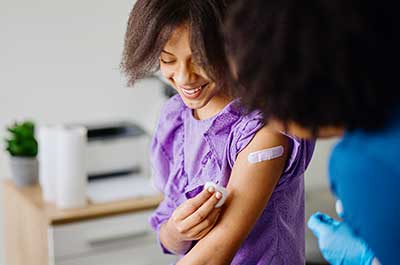Human papillomavirus (HPV) is the most common sexually transmitted infection. Most men and women who are sexually active get an HPV infection during their lifetime. Because HPV has no symptoms, people can pass along the infection without realizing it.
About 90% of people who get HPV clear the infection on their own within two years. The other 10% of people for whom HPV infections don’t resolve naturally are at increased risk of some types of cancer. The good news is that vaccination for HPV with the Gardasil 9 vaccine offers protection against HPV-related cancers.
The Centers for Disease Control and Prevention recommends the vaccine for people aged 9 to 26. In 2018, the Food and Drug Administration (FDA) also approved the HPV vaccine for adults aged 27 to 45. So should you get the HPV vaccine as an adult?
According to Vivian Wu, M.D., MPH, a head and neck cancer surgeon at Henry Ford Health, your doctor can help you answer that question. “Even if you’ve been infected with a certain subtype of HPV, the vaccine can protect you from rarer strains that cause cancer.”
The Link Between HPV Infection And HPV-Related Cancers
There are about 40 subtypes of HPV. Some strains cause warts while others can cause cancer. When the immune system cannot fight off a cancer-causing type of HPV, the virus integrates into DNA in the body’s cells.
Over time, HPV makes proteins in healthy cells that make it easier for cancer to develop. HPV-related cancers can develop in the cervix, penis, anus, head, neck and throat—often decades after the original infection.
Statistics about the incidence of HPV-related cancers in the U.S. highlight the impact of HPV infections. More than 11,000 women are diagnosed with cervical cancer each year, and 4,000 die from the disease.
HPV can also cause cancer in men. Four out of 10 HPV-related cancers are diagnosed in men each year. Most cases of throat cancer (80%) in men and women are caused by HPV. More than 14,000 people are diagnosed each year with throat cancer, which includes cancers of the back of the tongue and tonsils (oropharyngeal cancers).
An HPV test performed during a pelvic exam can identify infection with strains of HPV linked to cervical cancer. “Unfortunately, we don’t have a screening test to identify people at risk for HPV-related oropharyngeal cancers. So we may not find these cancers until they are more advanced and harder to treat,” says Dr. Wu. “That’s why the HPV vaccine is an important tool in preventing these cancers.”
Adults Who May Benefit From The HPV Vaccine
The vaccine offers the best protection when given to children before they are ever exposed to HPV. However, it can still reduce the risk of HPV-related cancers when given to adults.
Adults up to age 45 who may be more susceptible to HPV infections and benefit from the vaccine include:

Get The HPV Vaccine
- People who have or may have a new sex partner
- Men who have sex with men
- Transgender people
- People with a compromised immune system
The HPV vaccine is not recommended for:
- People who are allergic to any ingredients in the HPV vaccine
- People who have had a life-threatening reaction to a prior dose of the vaccine
- Individuals who have an allergy to yeast
- Women who are pregnant
“As with all vaccines, only get the HPV vaccine when you’re healthy. Delay vaccination if you have a cold, flu or viral infection,” says Dr. Wu.
How To Talk With Your Doctor About the HPV Vaccine
Your primary care doctor can help you decide if the HPV vaccine is suitable for you. Dr. Wu recommends sharing your medical and sexual history during your visit.
“Don’t hesitate to share any concerns you have with your physician. Your doctor can advise whether you can benefit from the HPV vaccine. You may decide to get the vaccine for additional protection against HPV-related cancers,” says Dr. Wu.
Reviewed by Vivian Wu, M.D., MPH, a head and neck cancer surgeon who sees patients at Henry Ford West Bloomfield Hospital, Henry Ford Medical Center - Plymouth and Henry Ford Cancer - Detroit.



